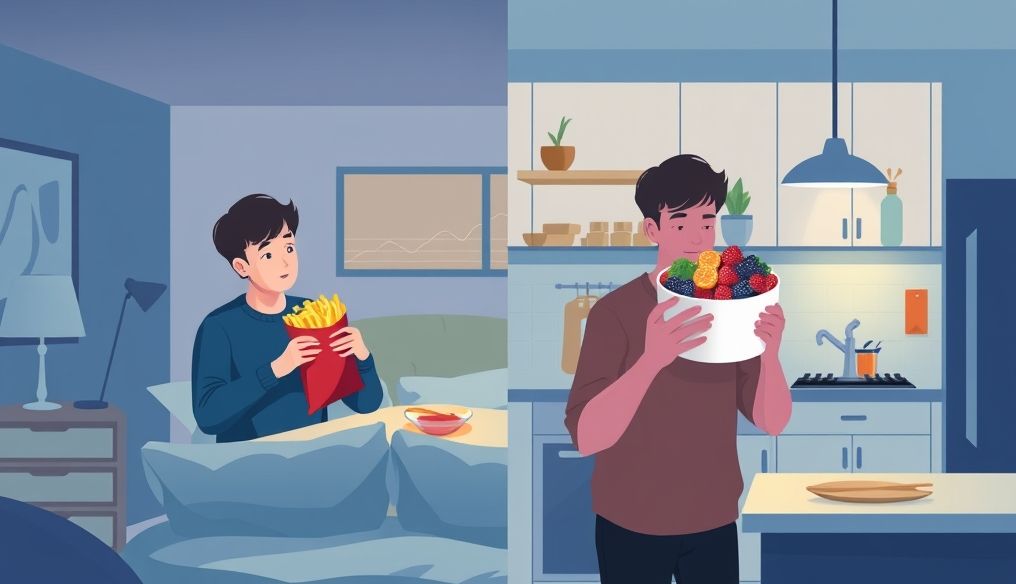Does Eating Late at Night Really Cause Weight Gain?
Eating late at night has long been associated with weight gain. We constantly hear that eating right before bed will inevitably lead to fat accumulation. But is this information entirely accurate? Let's delve into the science behind this idea and explore whether the time we eat really has a significant impact on our weight.
What Does Science Say?
Many studies suggest that eating late at night may be associated with weight gain, but not necessarily because of the timing itself. The reason is often that people who eat their meals late tend to consume more calories overall, and often choose unhealthy foods.
- Increased Calorie Intake: People who eat at night tend to consume larger and more calorie-dense meals.
- Unhealthy Food Choices: Late-night snacks are often processed and fast foods, such as potato chips and sweets.
- Lack of Physical Activity: After eating a heavy meal at night, you are less likely to exercise or do any physical activity.
Factors That Affect Weight Gain
There are many factors that contribute to weight gain, not just the timing of eating. Among these factors are:
- Total Calories Consumed: If you consume more calories than you burn, you will gain weight regardless of when you eat.
- Food Quality: Eating healthy and balanced foods helps maintain a healthy weight.
- Level of Physical Activity: Regular exercise helps burn calories and maintain weight.
- Sleep: Lack of sleep can affect the hormones that regulate appetite, leading to increased cravings for food.
- Stress: Chronic stress can lead to emotional eating and weight gain.
The Impact of the Biological Clock
The biological clock plays an important role in regulating many body functions, including appetite and metabolism. Some research suggests that eating at irregular times may disrupt the biological clock and affect metabolism.
However, this area is still under study, and there is not yet conclusive evidence that eating late at night negatively affects the biological clock significantly enough to cause direct weight gain.
Tips to Avoid Weight Gain Associated with Night Eating
If you are used to eating late at night, here are some tips that can help you avoid weight gain:
- Plan Your Meals: Plan your meals in advance and make sure they are balanced and healthy.
- Eat a Filling Dinner: Eat a dinner rich in protein and fiber to reduce the desire to eat late.
- Avoid Processed Foods: Stay away from processed foods and fast foods, and choose natural and healthy foods.
- Drink Water: Drink plenty of water throughout the day, especially before bed, to reduce hunger.
- Exercise Regularly: Exercise helps burn calories and maintain a healthy weight.
- Get Enough Sleep: Good sleep helps regulate appetite and reduce cravings for food.
- Manage Stress: Find healthy ways to deal with stress, such as practicing yoga or meditation.
Practical Examples
Suppose you feel hungry at 10 pm. Instead of eating potato chips, you can choose:
- Low-Fat Yogurt with Fruit: Provides protein, calcium, and fiber.
- A Handful of Nuts: Provides healthy fats and protein.
- A Slice of Whole Wheat Bread with Avocado: Provides fiber and healthy fats.
Case Studies
A study published in the journal "Obesity" showed that people who consume most of their calories late at night tend to have a higher body mass index (BMI) compared to those who consume most of their calories earlier in the day. However, the study also emphasized that total calorie intake was the main factor in weight gain.
Another study published in the "American Journal of Clinical Nutrition" found that eating a small, healthy snack before bed does not negatively affect metabolism or weight gain.
Conclusion
Eating late at night is not necessarily the main cause of weight gain. The most important factor is the total calories consumed and the quality of the food you eat. If you feel hungry at night, choose healthy snacks and make sure you are not consuming more calories than you burn. Maintain a healthy lifestyle that includes a balanced diet, regular exercise, and adequate sleep, and you will be able to maintain a healthy weight regardless of when you eat.
“Eating late at night isn't necessarily bad for you, but it can be if you're making poor food choices.”
– Harvard Health Publishing
Frequently Asked Questions
Does eating right before bed harm digestion?
Some people may experience indigestion if they eat a large meal right before bed. Try to eat dinner at least two hours before bed.
What are the best healthy snacks to eat at night?
Good options include low-fat yogurt, nuts, fruits, and vegetables.
Should I avoid eating carbohydrates at night?
There is no reason to avoid carbohydrates at night as long as you eat them in moderation and as part of a balanced diet.
How can I overcome the urge to eat at night?
Try to identify the reason behind the urge to eat. It may be due to boredom, stress, or bad habits. Find healthy ways to deal with these feelings.




